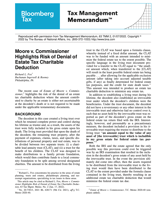Please click here to read the article in its entirety.
NBA Owner’s $10 Million Fine Is No Slam Dunk as a Tax Deduction
This article was originally published by Bloomberg Tax. You can access the original article here.
The NBA recently hit Robert Sarver, the managing partner of the Phoenix Suns, with a $10 million fine based on an independent report that found his conduct included racially insensitive language, unequal treatment of female employees, sex-related statements and conduct, and harsh treatment of employees that constituted bullying. The league announced that it will donate the funds paid by Sarver to organizations committed to addressing race- and gender-based issues in and outside the workplace.
A significant issue raised in this case is whether the American taxpayer will be forced to subsidize Sarver’s fine through the tax code as a business or charitable deduction. Although there is authority for the deduction of fines as an ordinary and necessary business expense, and a donation to charity is clearly deductible, there is little likelihood that Sarver’s $10 million fine is deductible.
Deduction of Fines as a Business Expense
Internal Revenue Code Section 162(f) specifically disallows a deduction for a fine paid to a government or governmental entity. Although no such disallowance rule exists for a fine paid to a private entity, such as a professional sports league, the payment must be considered “ordinary and necessary” to qualify as a business deduction. In this context, “ordinary” means common and accepted, while “necessary” is construed as helpful and appropriate.
Despite the vast array of fines that have been imposed on professional athletes and their coaches, there is little authority on the deductibility of fines in professional sports. In one case unrelated to athletics, the US Tax Court held that the payment of a $75,000 fine for disciplinary reasons by a futures broker to the Chicago Mercantile Exchange was an ordinary and necessary business expense and therefore deductible. Here, the court found that the broker’s actions for which he was fined were common among other brokers, and the payment allowed the broker to continue working on the exchange.
Fines imposed on professional athletes for disciplinary reasons for actions during a game should similarly be deductible. It has become an all-too-common occurrence for players to be fined for violating league rules during the course of a game. The payment of the fine allows the player to continue playing and receiving compensation, thus establishing the ordinary and necessary requirements for deductibility.
Another Tax Court case highlights deductibility hinging on a payment obligation arising out of conduct that is within the norm of common business practice. In that case, the court denied a business deduction for expenses incurred by the taxpayer—a noted artist—during air travel because it did not “believe it is ordinary for people in such trades or businesses to be involved in altercations of the sort here involved in the course of any such travel.” Indeed, the court pointed to cases where the actions taken by the taxpayer were “so extraordinary” as the basis for denying a claimed business deduction.
Charitable Deduction for Fines Paid to Charity
Donative intent is a “sine qua non” of any charitable contribution deduction, such that the contribution must be voluntarily made and without consideration for any transfer to charity to be deductible for tax purposes. Where a taxpayer is directed to transfer funds to a charity, therefore, no charitable income tax deduction can be claimed. Such is the situation, for example, where instead of paying a fine, a court directs a donation to be made to charity.
Similarly, where funds are given by a taxpayer to a private entity which then, at its own discretion, contributes those same funds to charity, there is no tracing of those funds back to the taxpayer that would support a charitable deduction.
The NBA, however, could take a charitable income tax deduction. It is voluntarily taking the $10 million payment for the fine and then, at its discretion, is donating it to charity. Nobody is making them do it, and the payment is considered to be the funds of the NBA once the penalty is received by the league.
Deductibility of Fine Paid by Sarver to NBA
There is little likelihood that Sarver would be entitled to any deduction for the $10 million fine paid to the NBA. Although his actions were apparently taken in the course of his trade or business as the managing partner of the Suns, his case is distinguishable from the actions of a professional athlete on the field of play where violations of league rules have become a normal and common occurrence.
Unlike that situation, Sarver would clearly be hard-pressed to assert that the conduct for which his fine arose is within the norm of common business practice and, indeed, was quite the opposite. On the charitable deduction side, Sarver clearly lacked any donative intent and, moreover, the contribution of the $10 million fine to charity is being made in the absolute discretion of the NBA with funds that are legally theirs.




